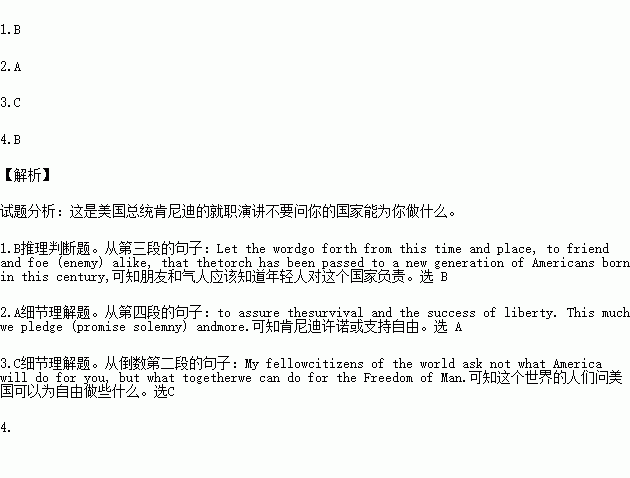题目内容
We observe today not a victory of party but a celebration of freedom, symbolizing an end as well as a beginning, signifying renewal as well as change for I have sworn before you and Almighty God the same solemn oath our forebears (ancestors) prescribed nearly a century and three-quarters ago.
The world is very different now, for man holds in his mortal hands the power to abolish all forms of human poverty and all forms of human life. And yet the same revolutionary beliefs for which our forebears fought are still at issue around the globe, the belief that the rights of man come not from the generosity of the state but from the hand of God. We dare not forget today that we are the heirs(继承人)of that first revolution.
Let the word go forth from this time and place, to friend and foe (enemy) alike, that the torch has been passed to a new generation of Americans born in this century, tempered by war, disciplined by a hard and bitter peace, proud of our ancient heritage and unwilling to disciplined by a hard and bitter peace, proud of our ancient heritage and unwilling to disciplined by a hard and bitter peace, proud of our ancient heritage and unwilling to witness or permit the slow undoing of those human rights to which this nation has always been committed, and to which we are committed today at home and around the world.
Let every nation know whether it wishes us well or ill that we shall pay any price, bear any burden, meet any hardship, support any friend, oppose any foe, to assure the survival and the success of liberty. This much we pledge (promise solemny) and more.
In the long history of the world, only a few generations have been granted the role of defending freedom in its hour of maximum danger. I do not shrink from this responsibility. I welcome it. I do not believe that any of us would exchange places with any other people or any other generation. The energy, the faith, the devotion which we bring to this endeavor will light our country and all who serve it and the glow from that fire can truly light the world.
And so, my fellow Americans ask not what your country can do for you; ask what you can do for your country. My fellow citizens of the world ask not what America will do for you, but what together we can do for the Freedom of Man.
Finally, whether you are citizens of America or citizens of the world, ask of us here the same high standards of strength and sacrifice which we ask of you. With a good conscience our only sure reward, with history the final judge of our deeds, let us go forth to lead the land we love, asking His blessing and His help, but knowing that here on earth God’s work must truly be our own.
1.What should friends and foes know?
A. That the United States is powerful.
B. That a new generation of Americans are responsible for their government.
C. That the United States is governed by liberals.
D. The rights of man come from the hand of God.
2.What is Kennedy’s promise to the world?
A. To support liberty.
B. To abolish all forms of human poverty.
C. To visit each country at least once.
D. To support and friend.
3. What should citizens of the world ask of America?
A. How America can help them.
B. If America plans to invade their country.
C. What they can do for freedom.
D. What they can do for America.
4.Which of the following statement is NOT true according to the passage?
A. Human beings have the power to put an end to all forms of poverty.
B. We should remember we are the first revolution.
C. Our nation has always been committed to human rights.
D. We should assure the survival and the success of liberty.

